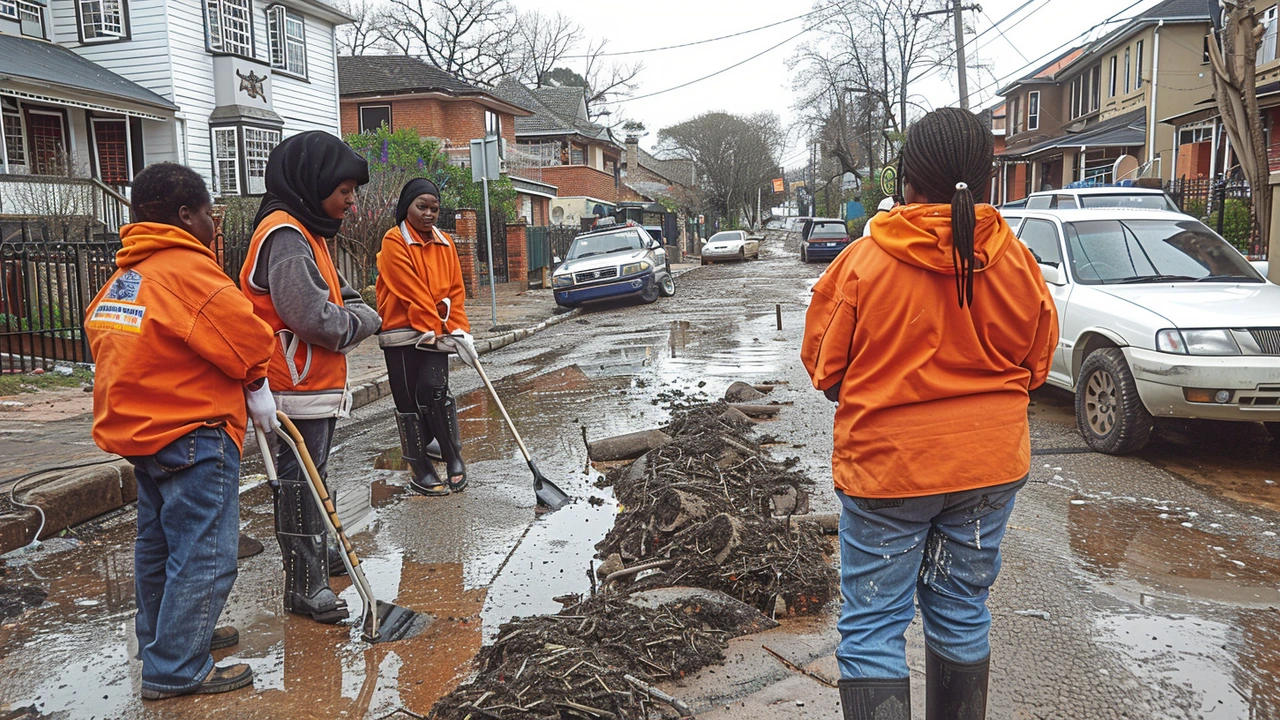Inequality in Cape Town: A Tale of Two Cities
Cape Town stands as a vibrant, diverse city in South Africa. Its stunning landscapes and bustling metropolitan areas paint a picture of prosperity. However, beneath this facade of opulence lies a stark reality of inequality. This divide is especially glaring in the townships like Gugulethu, where the residents grapple with daily hardships that starkly contrast with the affluence enjoyed by those in the more prosperous areas.
The Democratic Alliance's Governance
The Western Cape, including Cape Town, is unique in South Africa due to its governance by the Democratic Alliance (DA), making it the only province not controlled by the African National Congress (ANC). While this might signify a political breakthrough, it has not translated into meaningful improvements for the townships. Critics argue that the DA has prioritized service delivery and development in wealthier areas, leaving places like Gugulethu struggling with a lack of basic services, joblessness, and overcrowding.
Life in Gugulethu
To understand the depth of the issue, one need look no further than Gugulethu. Home to around 100,000 individuals, this township symbolizes the overarching problem of neglect. Residents here face myriad challenges daily. From high unemployment rates to inadequate housing and basic services, the residents' frustration and dissatisfaction with the DA's performance are palpable.
For example, the overcrowding in Gugulethu's schools is staggering. Classes are often packed beyond capacity, with educational resources stretched too thin. Health services are another significant concern. Local clinics are frequently overburdened, unable to provide timely care to the ailing masses. The infrastructure, too, is crumbling, with roads riddled with potholes and limited access to clean drinking water. Not surprisingly, the lack of opportunities has led to heightened crime rates, exacerbating the community's woes.

Voices of Activists and Residents
Many activists and local residents have voiced out against this glaring neglect. They argue that the DA has failed to address the pressing issues affecting these marginalized communities. Former DA leader, Mmusi Maimane, himself acknowledged that the party's efforts have fallen short. According to Maimane, the DA must take urgent and decisive action to improve the living conditions in these townships. He highlighted the need for a more inclusive approach that aligns with the residents' needs and aspirations.
Political analyst Levy Ndou echoes these sentiments, emphasizing that the DA’s successes in the city center are not reflective of the realities in townships like Gugulethu. He argues that a fundamental disconnect exists between the DA's policies and the lived experiences of the township residents. This disconnect, Ndou warns, could have significant repercussions, especially as the city gears up for the next election.
Political Parties and Election Promises
As the election town draws nearer, both the DA and ANC have intensified their focus on the Western Cape, particularly Cape Town. Each party is making grand promises to address the concerns of the residents. The ANC, in its campaign, has been particularly pointed in its criticism of the DA's performance. They have highlighted the disparities between the affluent neighborhoods and the impoverished townships, vowing to prioritize equitable development if elected.
The DA, on the other hand, is striving to present itself as a party capable of bringing about meaningful change. They've rolled out several policy initiatives aimed at addressing the issues faced by these communities. These include plans to improve education, enhance health services, and create job opportunities. However, many residents remain skeptical, having heard similar promises in the past with little to show for them.
The Lingering Shadow of Apartheid
The lingering economic inequities and spatial dynamics of apartheid continue to haunt South Africa. Despite the advent of democracy in 1994, the country remains deeply divided along economic and racial lines. The legacy of apartheid, characterized by systematic and institutionalized segregation, has left an indelible mark on the nation's socio-economic landscape.
In places like Cape Town, the spatial dynamics of apartheid are still evident. The city’s layout starkly segregates affluent and impoverished areas. Wealthier neighborhoods, predominantly inhabited by the white population, are equipped with all the amenities and luxuries one could ask for. Contrastingly, the townships, where the majority are Black and Colored communities, remain mired in poverty and neglect.

Addressing the Root Causes
For Cape Town to truly live up to its potential as a world-class city, it must address these deep-seated inequalities. This entails a concerted effort by both the government and civil society to address the root causes of these disparities. Key to this is acknowledging the past and understanding how it continues to impact the present. Only by doing this can meaningful and sustainable change be achieved.
Community Initiatives and Hope for the Future
Despite the challenges, there is hope. Numerous community initiatives have sprung up within the townships. These grassroots movements aim to empower residents, providing them with the tools and resources needed to improve their circumstances. From youth empowerment programs to cooperative economic ventures, these initiatives demonstrate the resilience and determination of the township residents.
International organizations and NGOs have also played a significant role in supporting these communities. Partnerships between local and international entities have resulted in various development projects aimed at improving education, healthcare, and infrastructure within the townships.
The Role of Businesses
Businesses, too, have a crucial role to play. Corporate social responsibility (CSR) initiatives targeting the townships can make a significant impact. By investing in these communities, businesses can help bridge the gap between the wealthy and the impoverished, fostering a more inclusive and equitable society. Some companies have already taken steps in this direction, initiating programs that provide skills training, job opportunities, and support for local entrepreneurs.
Conclusion: A City at a Crossroads
With the upcoming elections, Cape Town stands at a crossroads. The choices made by both the government and the electorate will shape the city's future. It's a chance for Cape Town to address its inequalities head-on and strive towards a more inclusive and equitable society. While the challenges are significant, so too is the opportunity for change. It remains to be seen whether the promises made will translate into tangible improvements for the residents of townships like Gugulethu.


Comments
Jeff Byrd
Wow, another post about Cape Town’s glitter and grime. You’d think the DA would magically sprinkle services like confetti, but nope. The townships keep getting the short end of the stick while the rich sip wine on the waterfront. It’s almost comical how the headlines scream “progress” yet the streets of Gugulethu whisper “forgotten”. Guess the city’s two‑speed soundtrack just keeps playing on repeat.
May 29, 2024 at 23:58
Joel Watson
The persistent disjunction between municipal rhetoric and material reality in the Western Cape epitomizes a post‑colonial paradox that demands rigorous scholarly interrogation. One must first acknowledge that the Democratic Alliance’s administrative paradigm operates within a neoliberal framework that privileges capital accumulation over distributive justice. Consequently, infrastructural investments are disproportionately allocated to enclaves whose tax contributions substantiate a service hierarchy reminiscent of apartheid spatial planning. The ecological externalities promulgated upon the informal settlements, such as Gugulethu, further exacerbate a cyclical impoverishment that is both systemic and intentional. Empirical data from municipal service audits unequivocally demonstrate a latency in water provision, electricity connectivity, and educational resource distribution within these marginalized precincts. Moreover, the statistical correlation between political patronage and the geographic dispersion of development projects underscores a patron‑client nexus that subverts democratic accountability. It is imperative to interrogate the disciplinary rhetoric employed by DA officials, which obfuscates the material grievances of township residents beneath a veneer of technocratic optimism. The discursive stratagem of “service delivery” thus functions as a linguistic shield, deflecting culpability while perpetuating a status quo that benefits the urban elite. In a comparative analysis with ANC‑governed provinces, one observes a mere marginal improvement in township infrastructure, suggesting that party affiliation alone cannot rectify entrenched inequities. Nevertheless, the entanglement of ideological posturing with fiscal mismanagement creates a feedback loop wherein promises remain aspirational rather than operational. The sociopolitical fabric of Cape Town, therefore, manifests as a palimpsest of historical dispossession overlaid with contemporary policy inertia. The resultant affective climate among township denizens is one of disenfranchisement, which, if left unaddressed, may precipitate heightened civil unrest. Scholars of urban governance contend that sustainable amelioration necessitates a paradigm shift toward participatory budgeting and community‑led development initiatives. Such an approach would recalibrate the power dynamics, granting agency to those traditionally excluded from the corridors of decision‑making. Ultimately, the resolution of Cape Town’s bifurcated reality rests upon a confluence of political will, equitable resource allocation, and an unwavering commitment to redress historical injustices.
May 30, 2024 at 02:45
Chirag P
Reading through the overview, it becomes clear that the structural neglect of townships is not merely an oversight but a systemic failure. As someone who values cultural context, I see the lingering apartheid imprint in the spatial segregation. The lack of basic services directly erodes human dignity and hampers socioeconomic mobility. It is crucial that policymakers prioritize inclusive planning rather than piecemeal fixes. Only then can we begin to bridge the widening chasm between affluent suburbs and underserved communities.
May 30, 2024 at 05:32
RUBEN INGA NUÑEZ
Exactly. The data you cite reflects a pattern of selective investment that the DA exploits for political capital. Overcrowded schools, dilapidated clinics, and pothole‑ridden roads are not isolated incidents-they are symptoms of a deliberate policy bias. If the municipality truly intended equitable development, the budget would visibly reflect a redistribution toward these forgotten zones.
May 30, 2024 at 08:18
Michelle Warren
The inequality picture is painfully clear.
May 30, 2024 at 11:05
Christopher Boles
I totally agree that we need more community programs to help out. Simple things like after‑school clubs and job training can make a huge difference. It’s great to hear that NGOs are already stepping in, but the government should back them up with steady funding.
May 30, 2024 at 13:52
Crystal Novotny
Maybe we’re focusing too much on the DA and not enough on grassroots resilience. The townships have their own strengths that often get ignored.
May 30, 2024 at 16:38
Reagan Traphagen
Let’s not be fooled by the polished press releases. The DA is just another arm of the global elite, using Cape Town as a showcase while siphoning wealth to offshore accounts. Every new “initiative” is a smoke‑screen to keep the real agenda hidden. Wake up, people.
May 30, 2024 at 19:25
mark sweeney
i guess the real problem is not the party but our own blind spot. we keep looking at statistics and forget that behind each number is a human story. if we stop treating ppl as data points maybe we can actually fix stuff.
May 30, 2024 at 22:12
randy mcgrath
The conversation reminds me of the broader issue of urban inequality worldwide. Cities like Rio or Mumbai face similar divides, showing that this is a global challenge. Learning from other metropolises could provide useful strategies for Cape Town.
May 31, 2024 at 00:58
Frankie Mobley
One practical step would be to establish community councils that have real budgetary authority. When locals decide how funds are spent, projects become more relevant and effective. This model has worked in parts of Brazil and could be adapted here.
May 31, 2024 at 03:45
ashli john
Really inspiring to see people talking about change it feels like a spark that could grow into something big we just need to keep the conversation alive and keep supporting each other
May 31, 2024 at 06:32
Kim Chase
Exactly, maintaining the momentum is key. We should also create online platforms where residents can share ideas and resources, making it easier for NGOs and local businesses to collaborate. By building a digital hub, we can amplify voices that are often unheard and coordinate efforts across different sectors.
May 31, 2024 at 09:18
David Werner
The looming elections are just a curtain call for the real puppeteers. Behind the promises lies an orchestrated plan to keep the majority in perpetual dependency while the hidden financiers profit. If we don’t see through this charade, the cycle of oppression will tighten its grip.
May 31, 2024 at 12:05
Paul KEIL
From a systemic risk perspective the governance vacuum creates a feedback loop of fiscal leakage and social volatility which, in turn, catalyzes a resilience deficit across the urban substrate.
May 31, 2024 at 14:52
Horace Wormely
The article contains several misspellings of “inequality” and inconsistent usage of hyphens in compound adjectives. Proper editing would enhance credibility and ensure that readers receive accurate information without distraction.
May 31, 2024 at 17:38